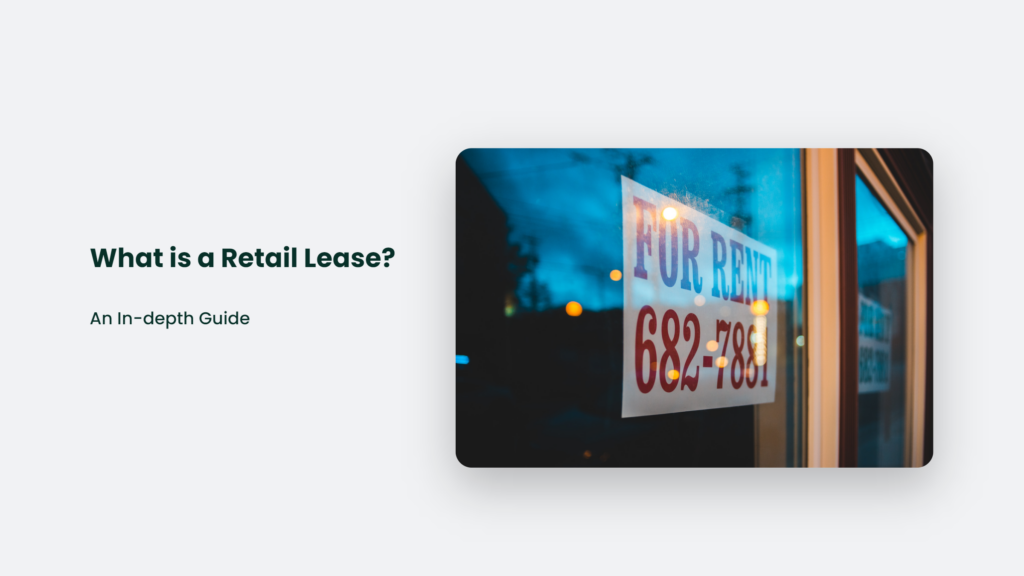So you want to open up a kickass retail store. You’ve got a great product, an amazing brand, and a vision for world domination. But there’s one big friggin’ problem – you don’t have a place to sell all that awesome shit yet.
That’s where retail leases come in.
I know, I know. Leases sound boring as hell. All that legal mumbo jumbo makes you want to stab yourself in the eye with a spork. But finding a suitable retail space for your business is crucial, so you have to grin and bear it.
Stick with me, and I’ll walk you through everything you need to know about what is a retail lease so you can find the perfect spot, negotiate a killer deal, and get your shop up and running. We’ll have some laughs, I’ll drop some f-bombs, and we’ll get through this crap together.

What is a Retail Lease?
A retail lease is a legally binding contract between a landlord and a tenant for the rental of commercial space. As the tenant, you agree to pay rent and follow the terms of the lease in exchange for the right to occupy the space and operate your business there.
It’s a lot like renting an apartment, except the spaces are bigger, the leases are longer, and there’s much more on the line if things go sideways. No pressure or anything.
Retail leases typically include details like:
- The premises – what specific space/unit you’re renting
- The term – how long the lease lasts
- Rent – the base amount you pay each month
- Additional rent – charges for property taxes, maintenance, etc.
- Use – what you’re allowed to sell and do in the space
- Exclusives – limits on competing businesses in the area
And a crapload of other nitpicky stuff like renewal options, build-out terms, and assignment/subletting rules. But let’s not get ahead of ourselves.
What Can You Sell There?
Once you’ve picked out a few potential spots, you need to find out what the hell you’re allowed to sell there.
Most retail leases limit the type of business and merchandise permitted on the premises. This keeps things balanced and avoids having a Dick’s Sporting Goods next to a strip club. (Although that could be interesting…)
These “use clauses” can be super specific, so read carefully. For example, a lease could say you can only sell “high-end women’s shoes and handbags.” If you primarily sell wallets and accessories, you’re shit out of luck.
Exclusivity is a big one, too. Landlords often give one business exclusive rights to sell certain products so competitors can’t move in. If there’s already a Starbucks, you can’t open another coffee shop.
How Much is This Gonna Cost Me?
Base Rent
The minimum rent amount you agree to pay each month is typically quoted as a dollar amount per square foot. A 1,000-square-foot space at $25/sq.ft would have a base rent of $25,000/month.
Base rent often increases over time, too. Your lease might start at $25/sq.ft but go up to $27/sq.ft in year two and $29/sq.ft in year three. Landlords build in these bumps to keep up with inflation and market rates.
Additional Rent
On top of base rent, you’ll also pay your “pro rata share” (proportionate amount based on square footage) of certain property operating expenses and taxes. It is called “additional rent”.
Common area maintenance (CAM), property insurance, and property taxes are prorated among tenants. So if the whole property’s taxes are $100,000 for the year and your space is 10% of the total square footage, you’d pay $10,000 for it.
Additional rent costs can sneak up on you, so comb through the lease to estimate these expenses accurately. A higher base rent but lower add-ons might be better than vice versa.
How Long Is This Lease For?
Retail lease terms typically range from 5-10 years. Shorter leases (3-5 years) are common for new/unproven concepts or temporary tenants. Longer leases (10+ years) may be required for extensive build-outs or prime locations.
A longer initial term lowers risk for the landlord, so they may offer a lower base rent or better allowances. But you sacrifice flexibility if your business needs change.
Shorter terms provide more flexibility and outs if your concept tanks but often have higher rents since the landlord is taking on more risk.
Most leases let you renew for additional term(s) after the initial term expires. The lease will specify if base rent increases and any other changes upon renewal.
Pro tip: Try to negotiate a continuous operating covenant that allows you to stay as a month-to-month tenant if the lease isn’t renewed. It prevents having to close up shop immediately.
Frequently Asked Questions:
What costs and fees should I budget for upfront?
Plan for a security deposit, first month’s rent, tenant improvements, legal fees, permits/fees, furnishings, signage, moving costs, and initial inventory. It adds up fast.
Who pays for building out the space?
The tenant usually pays for any leasehold improvements they want. But landlords sometimes offer an improvement allowance or do certain base build-outs.
What are common additional rent charges?
CAM, property taxes, insurance, trash collection, landscaping, parking lot/exterior maintenance, utilities if not separately metered.
The Bottom Line
Signing a retail lease is a huge commitment, but nailing down the perfect space for your business is thrilling. Don’t let the legalese intimidate you. Take time, understand the key terms, push for favourable conditions, and protect yourself with experienced advisors.
With smart planning, tough negotiation, and a little luck, you’ll secure an amazing launchpad for your company. Then you can focus on all the fun stuff – building out your dream store, filling it with awesome products, and getting customers in the damn door.
Who’s ready to sign a lease and get this party started?!




